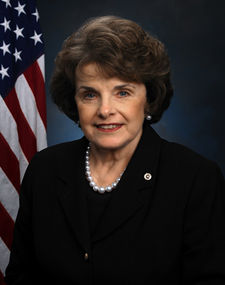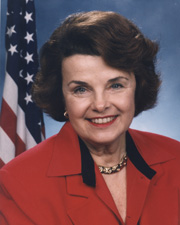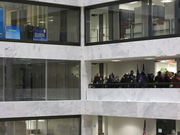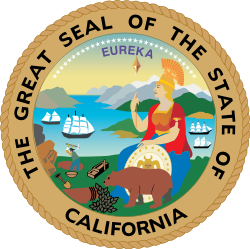Dianne Feinstein
| Dianne Feinstein | |
 |
|
|
|
|
| Incumbent | |
| Assumed office November 10, 1992 Serving with Barbara Boxer |
|
| Preceded by | John F. Seymour |
|---|---|
|
|
|
| In office December 4, 1978 – January 8, 1988 |
|
| Preceded by | George Moscone |
| Succeeded by | Art Agnos |
|
Chairwoman of the United States Senate Select Committee on Intelligence
|
|
| Incumbent | |
| Assumed office January 6, 2009 |
|
| Preceded by | John D. Rockefeller IV |
|
Chairwoman of the Senate Committee on Rules and Administration
|
|
| In office January 4, 2007 – January 3, 2009 |
|
| Preceded by | Trent Lott |
| Succeeded by | Chuck Schumer |
|
Member of the San Francisco Board of Supervisors
|
|
| In office 1970–1978 |
|
|
|
|
| Born | June 22, 1933 San Francisco, California |
| Political party | Democratic |
| Spouse(s) | Judge Jack Berman (div.) Bertram Feinstein (deceased) Richard C. Blum (1980 - ) |
| Children | Katherine Feinstein Mariano |
| Residence | San Francisco, California |
| Alma mater | Stanford University |
| Occupation | United States Senator |
| Religion | Judaism |
Dianne Goldman Berman Feinstein (pronounced /ˈfaɪnstaɪn/; born June 22, 1933) is the senior U.S. Senator from California and a member of the Democratic Party. Feinstein was first elected to the U.S. Senate in 1992, was re-elected in 1994, 2000 and in 2006 for a term ending in January 2013. She also served as Mayor of San Francisco from 1978 to 1988.
Feinstein was the first female President of the San Francisco Board of Supervisors, San Francisco's first (and, so far, only) female mayor, the first woman to serve in the Senate from California, and the first woman to chair the Senate Rules Committee and Senate Intelligence Committee.[1] Feinstein is also the first woman to have presided over a U.S. presidential inauguration.[2][3]
Contents |
Early life
Feinstein was born Dianne Emiel Goldman[4] in San Francisco to Betty (née Rosenburg), a former model, and Leon Goldman, a nationally renowned surgeon. Feinstein's paternal grandparents were Jewish immigrants from Poland, while her maternal grandparents, who were of the Russian Orthodox faith, left St. Petersburg, Russia, after the 1917 Russian Revolution.[5]
Personal life
In 1956, she married Jack Berman (died 2002), a colleague in the San Francisco District Attorney's office. Feinstein and Berman divorced three years later. Their daughter, Katherine Feinstein Mariano (b. 1957), is a Superior Court judge in San Francisco.
In 1962, shortly after beginning her career in politics, Feinstein married neurosurgeon Bertram Feinstein; her second husband died of colon cancer in 1978.
In 1980, Feinstein married Richard C. Blum, an investment banker. In 2003, Feinstein was ranked the fifth-wealthiest senator, with an estimated net worth of $26 million.[6] By 2005 her net worth had increased to between $43 million and $99 million.[7] Her 347-page financial-disclosure statement[8] – characterized by the San Francisco Chronicle as "nearly the size of a phonebook" – draws clear lines between her assets and those of her husband, with many of her assets in blind trusts.[9]
Early political career
In 1961, Feinstein worked to end housing discrimination in San Francisco.[10] Prior to elected service, she was appointed by then-California Governor Pat Brown to serve as a member of the California Women's Parole Board.
President of the San Francisco Board of Supervisors
In 1969, Feinstein was elected to the San Francisco Board of Supervisors. She remained on the Board for nine years and became its first female president.
During her tenure on the Board of Supervisors, she unsuccessfully ran for mayor of San Francisco twice, in 1971 against mayor Joseph Alioto, and in 1975, when she lost the contest for a runoff slot (against George Moscone) by one percentage point, to supervisor John Barbagelata.
On November 27, 1978, San Francisco mayor George Moscone and supervisor Harvey Milk were assassinated by a rival politician, Dan White, who had resigned from the Board of Supervisors only two weeks prior. Feinstein was close by in City Hall at the time of the shootings, and discovered Milk's body after hearing the gunshots and going to investigate. Later that day at a press conference originally organized by Moscone to announce White's successor, Feinstein announced the assassinations to the stunned public, stating: "As president of the board of supervisors, it's my duty to make this announcement. Both Mayor Moscone and Supervisor Harvey Milk have been shot and killed."[11]
Feinstein appears in archival footage and is credited in the Academy Award-winning documentary film The Times of Harvey Milk (1984). She appears again briefly in archival footage, announcing the death of Moscone and Milk in the 2008 film Milk. Feinstein and her position as President of the San Francisco Board of Supervisors are also alluded to several times in the movie, and a portrayal of her character has a few off-screen lines.
As president of the Board of Supervisors upon the death of Mayor Moscone, Feinstein succeeded to the mayoralty on December 4, 1978.
Mayor of San Francisco

Feinstein served out the remainder of the term and was elected in her own right in 1979 and re-elected in 1983.
One of the first challenges to face Feinstein as mayor was the state of the San Francisco cable car system. In late 1979, the system had to be shut down for emergency repairs, and an engineering evaluation concluded that it needed comprehensive rebuilding at a cost of $60 million. Feinstein took charge of the effort, and helped win federal funding for the bulk of the rebuilding job. The system closed for rebuilding in 1982 and reopened in 1984 in time for the Democratic National Convention that was held in the city that year.[12] Feinstein also oversaw planning policies to increase the number of high rise buildings in San Francisco.[13]
Perhaps because of her statewide ambitions, Feinstein was seen as a relatively moderate Democrat in one of the country's most liberal cities. As a supervisor, she was considered part of the centrist bloc that included Dan White and was generally opposed to Moscone. As mayor, Feinstein angered the city's large gay community by refusing to march in a gay rights parade and by vetoing domestic partner legislation in 1983. In the 1980 presidential election, while a majority of Bay Area Democrats continued to support Senator Ted Kennedy's primary challenge to President Jimmy Carter even after it was clear Kennedy could not win, Feinstein was a strong supporter of the Carter-Mondale ticket. She was given a high profile speaking role on the opening night of the August Democratic National Convention, urging delegates to reject the Kennedy delegates' proposal to "open" the convention, thereby allowing delegates to ignore their states' popular vote, a proposal that was soundly defeated.
In the run up to the 1984 Democratic National Convention, there was considerable media and public speculation that Democratic presidential nominee Walter Mondale might pick Feinstein as his running mate. However, he chose Geraldine Ferraro instead. Also in 1984, Feinstein proposed banning handguns in San Francisco, and became subject to a recall attempt organized by the White Panther Party. She won the recall election and finished her second term as mayor on January 8, 1988.
In 1985, at a press conference, Feinstein revealed details about the hunt for serial killer Richard Ramírez, and in so doing angered detectives by giving away details of his crimes.[14]
In 1987, City and State magazine named Feinstein the nation's "Most Effective Mayor". Feinstein served on the Trilateral Commission during the 1980s while mayor of San Francisco.
Governor's election
In 1990, Feinstein made an unsuccessful bid for Governor of California. Although she won the Democratic Party's nomination for the office, she then lost in the general election to Republican Senator Pete Wilson, who vacated his seat in the Senate to assume the governorship. In 1992, she was fined $190,000 for failure to properly report campaign contributions and expenditures associated with that campaign.[15]
U.S. Senate career
Elections

On November 3, 1992, Feinstein won a special election to fill the Senate vacated a year earlier when Senator Pete Wilson resigned to become governor. The election was held at the same time as the general election for U.S. President and other offices. Barbara Boxer was elected at the same time for the Senate seat to be vacated by Alan Cranston. Because Feinstein was elected to an unexpired term, she became a senator as soon as the election was certified in November while Boxer would not take office until the expiration of Cranston's term in January; thus Feinstein became California's senior senator, even though she was elected at the same time as Barbara Boxer. Feinstein was re-elected in 1994, 2000, and 2006.
Approval ratings
| Source | Date | Approve | Disapprove | Undecided |
|---|---|---|---|---|
| Survey USA | July 22, 2010 | 44% | 49% | 7% |
Committees
- Committee on Appropriations
- Subcommittee on Agriculture, Rural Development, Food and Drug Administration, and Related Agencies
- Subcommittee on Commerce, Justice, Science, and Related Agencies
- Subcommittee on Defense
- Subcommittee on Energy and Water Development
- Subcommittee on Interior, Environment, and Related Agencies (Chairwoman)
- Subcommittee on Transportation, Housing and Urban Development, and Related Agencies
- Committee on the Judiciary
- Subcommittee on Administrative Oversight and the Courts
- Subcommittee on the Constitution
- Subcommittee on Crime and Drugs
- Subcommittee on Immigration, Border Security, and Refugees
- Subcommittee on Terrorism and Homeland Security
- Committee on Rules and Administration
- Select Committee on Intelligence (Chairwoman)
Political positions
2008 presidential politics

As a superdelegate, Feinstein had declared that she would support Hillary Clinton for the Democratic presidential nomination. However, once Barack Obama became the presumptive nominee for the party, she fully backed his candidacy. Days after Obama amassed enough delegates to win the Democratic Party nomination, Feinstein lent her Washington, DC home to both Clinton and Obama to have a private one on one meeting.[16] Feinstein did not attend the 2008 Democratic National Convention in Denver because she fell and broke her ankle.[17]
She chaired the United States Congress Joint Committee on Inaugural Ceremonies, and acted as master of ceremonies, introducing each participant at the 2009 presidential inauguration.[18]
2010 Gubernatorial election
Feinstein had been reported as considering a run for Governor of California in 2010 to replace term limited Republican incumbent Arnold Schwarzenegger. A private poll in July 2008 showed Feinstein far outpacing former governor Jerry Brown, 50 percent to 24 percent, with Congressman John Garamendi at 10 percent.[19] A February 2009 poll showed that 36 percent of Democrats sampled in the poll said they would support Feinstein if she ran for governor. Brown earned 14 percent, followed by Gavin Newsom and Antonio Villaraigosa, at 9 percent and 22 percent undecided.[20] By October, although undeclared, in a poll by Field Research she led the Democratic field with 52 percent of all voters and 68 percent of Democratic voters.[21] After months of speculation, Feinstein announced in February 2010 that she would not be running for governor.[22]
Awards and honors
Feinstein was presented with the Woodrow Wilson Award for public service by the Woodrow Wilson Center of the Smithsonian Institution on November 3, 2001 in Los Angeles, California.
Offices held
| Public Offices | |||||
|---|---|---|---|---|---|
| Office | Type | Location | Elected | Term began | Term ended |
| Mayor | Executive | San Francisco | 1978 | December 4, 1978 | January 8, 1980 |
| Mayor | Executive | San Francisco | 1979 | January 8, 1980 | January 8, 1984 |
| Mayor | Executive | San Francisco | 1983 | January 8, 1984 | January 8, 1988 |
| Senator | Legislature | Washington, D.C. | 1992 | November 10, 1992 | January 3, 1995 |
| Senator | Legislature | Washington, D.C. | 1994 | January 3, 1995 | January 3, 2001 |
| Senator | Legislature | Washington, D.C. | 2000 | January 3, 2001 | January 3, 2007 |
| Senator | Legislature | Washington, D.C. | 2006 | January 3, 2007 | January 3, 2013 |
| United States Senate service | ||||||
|---|---|---|---|---|---|---|
| Dates | Congress | Chamber | Majority | President | Committees | Class |
| 1993–1995 | 103rd | U.S. Senate | Democratic | Bill Clinton | Rules, Judiciary, Appropriations, Intelligence | 1 |
| 1995–1997 | 104th | U.S. Senate | Republican | Bill Clinton | Rules, Judiciary, Appropriations, Intelligence | 1 |
| 1997–1999 | 105th | U.S. Senate | Republican | Bill Clinton | Rules, Judiciary, Appropriations, Intelligence | 1 |
| 1999–2001 | 106th | U.S. Senate | Republican | Bill Clinton | Rules, Judiciary, Appropriations, Intelligence | 1 |
| 2001–2003 | 107th | U.S. Senate | Democratic | George W. Bush | Rules, Judiciary, Appropriations, Intelligence | 1 |
| 2003–2005 | 108th | U.S. Senate | Republican | George W. Bush | Rules, Judiciary, Appropriations, Intelligence | 1 |
| 2005–2007 | 109th | U.S. Senate | Republican | George W. Bush | Rules, Judiciary, Appropriations, Intelligence | 1 |
| 2007–2009 | 110th | U.S. Senate | Democratic | George W. Bush | Rules (chair), Judiciary, Appropriations, Intelligence | 1 |
| 2009–2011 | 111th | U.S. Senate | Democratic | Barack Obama | Rules, Judiciary, Appropriations, Intelligence (chair) | 1 |
Electoral history
| California gubernatorial election, 1990 | |||||
|---|---|---|---|---|---|
| Party | Candidate | Votes | % | ±% | |
| Republican | Pete Wilson | 3,791,904 | 49.2 | ||
| Democratic | Dianne Feinstein | 3,525,197 | 45.8 | ||
| Libertarian | Dennis Thompson | 145,628 | 1.9 | ||
| American Independent | Jerome McCready | 139,661 | 1.8 | ||
| Peace and Freedom | Maria Elizabeth Munoz | 96,842 | 1.3 | ||
| Total votes | 7,699,232 | % | |||
| Majority | 266,707 | 3.4 | |||
| Turnout | |||||
| Republican hold | Swing | ||||
| California United States Senate special election, 1992 | |||||
|---|---|---|---|---|---|
| Party | Candidate | Votes | % | ±% | |
| Democratic | Dianne Feinstein | 5,853,651 | 54.3 | ||
| Republican | John F. Seymour (incumbent) | 4,093,501 | 38.0 | ||
| Peace and Freedom | Gerald Horne | 305,697 | 2.8 | ||
| American Independent | Paul Meeuwenberg | 281,973 | 2.6 | ||
| Libertarian | Richard Benjamin Boddie | 247,799 | 2.3 | ||
| Total votes | 10,782,621 | % | |||
| Majority | 1,760,050 | 16.3 | |||
| Turnout | |||||
| Democratic gain from Republican | Swing | ||||
| California United States Senate election, 1994 | |||||
|---|---|---|---|---|---|
| Party | Candidate | Votes | % | ±% | |
| Democratic | Dianne Feinstein (incumbent) | 3,979,152 | 46.7 | -7.6 | |
| Republican | Michael Huffington | 3,817,025 | 44.8 | +6.8 | |
| Peace and Freedom | Elizabeth Cervantes Barron | 255,301 | 3.0 | +0.2 | |
| Libertarian | Richard Benjamin Boddie | 179,100 | 2.1 | -0.6 | |
| American Independent | Paul Meeuwenberg | 142,771 | 1.7 | -0.9 | |
| Green | Barbara Blong | 140,567 | 1.7 | +1.7 | |
| Total votes | 8,513,916 | % | |||
| Majority | 162,127 | 1.9 | -14.4 | ||
| Turnout | |||||
| Democratic hold | Swing | -14.4 | |||
| California United States Senate election, 2000 | |||||
|---|---|---|---|---|---|
| Party | Candidate | Votes | % | ±% | |
| Democratic | Dianne Feinstein (incumbent) | 5,932,522 | 55.8 | +9.1 | |
| Republican | Tom Campbell | 3,886,853 | 36.6 | -8.2 | |
| Green | Medea Susan Benjamin | 326,828 | 3.1 | +1.4 | |
| Libertarian | Gail Lightfoot | 187,718 | 1.8 | -0.3 | |
| American Independent | Dianne Beall Templin | 134,598 | 1.3 | -0.4 | |
| Reform | Jose Luis Olivares Camahort | 96,552 | 0.9 | +0.9 | |
| Natural Law | Brian M. Rees | 58,537 | 0.5 | +0.5 | |
| Total votes | 10,623,608 | % | |||
| Majority | 2,045,669 | 19.2 | +17.3 | ||
| Turnout | |||||
| Democratic hold | Swing | +17.3 | |||
| California United States Senate election, 2006 | |||||
|---|---|---|---|---|---|
| Party | Candidate | Votes | % | ±% | |
| Democratic | Dianne Feinstein (incumbent) | 5,076,289 | 59.4 | +3.6 | |
| Republican | Dick Mountjoy | 2,990,822 | 35.0 | -1.6 | |
| Green | Todd Chretien | 147,074 | 1.7 | -1.4 | |
| Libertarian | Michael S. Metti | 133,851 | 1.6 | -0.2 | |
| Peace and Freedom | Marsha Feinland | 117,764 | 1.4 | +1.4 | |
| American Independent | Don J. Grundmann | 75,350 | 0.9 | -0.4 | |
| Total votes | 8,541,150 | % | |||
| Majority | 2,085,467 | 24.4 | +5.2 | ||
| Turnout | |||||
| Democratic hold | Swing | +5.2 | |||
See also
- California government and politics
Footnotes
- ↑ Coile, Zachary (2009-01-11). "Feinstein gets nod to chair intelligence panel". The San Francisco Chronicle. http://www.sfgate.com/cgi-bin/article.cgi?f=/c/a/2008/12/16/MNBV14OHE5.DTL&hw.
- ↑ "Feinstein plays key role". San Diego Union-Tribune (Copley News Service). January 21, 2009. http://www3.signonsandiego.com/stories/2009/jan/21/1n21notebook002133-feinstein-plays-key-role/?uniontrib. Retrieved 2009-01-22.
- ↑ Associated Press and Agence France-Presse (January 21, 2009). "Millions witness moment". The Straits Times ((Singapore)). http://www.straitstimes.com/Breaking%2BNews/World/Story/STIStory_328905.html. Retrieved 2009-01-20.
- ↑ "Fe". Real Names of Famous Folk. http://www.famousfolk.com/real/names-f/fe.shtml. Retrieved November 11, 2007.
- ↑ Slater, Robert; Elinor Slater (2004). Great Jewish Women. Middle Village, New York: Jonathan David Publishers. p. 78. ISBN 0-8246-0370-2 1. http://books.google.com/books?id=oR_4rVfE438C&pg=PP1&ots=uOmRhvQHul&dq=%22GREAT+JEWISH+WOMEN%22&sig=j5SwVzOi6-pSVjTs9h8xMJ43b94.
- ↑ Loughlin, Sean; Robert Yoon (2003-06-13). "Millionaires populate U.S. Senate". CNN. http://www.cnn.com/2003/ALLPOLITICS/06/13/senators.finances/. Retrieved 2007-05-07.
- ↑ "Personal Financial Disclosures Summary: 2005". opensecrets.org. http://www.opensecrets.org/politicians/pfds.asp?CID=N00007364. Retrieved 2007-05-09.
- ↑ "Senate Public Financial Disclosure Report for Senator Diane Feinstein" (PDF). US Senate/Washington Post. 2006-06-09. http://www.washingtonpost.com/wp-srv/politics/congress/fin_dis/f000062.pdf. Retrieved 2007-05-07.
- ↑ Coile, Zachary (2004-06-26). "Bay lawmakers among wealthiest". San Francisco Chronicle. http://www.sfgate.com/cgi-bin/article.cgi?file=/c/a/2004/06/26/BAG7B7CDMQ1.DTL. Retrieved 2007-05-07.
- ↑ Clarence Johnson (1995-10-24). "PAGE ONE – It's Brown vs. Brown Ex-speaker's reputation helps, hinders him". The San Francisco Chronicle. http://www.sfgate.com/cgi-bin/article.cgi?f=/c/a/1995/10/24/MN71927.DTL. Retrieved 2008-02-23.
- ↑ "The Times of Harvey Milk". Internet Movie Database. http://www.imdb.com/title/tt0088275/. Retrieved 2007-05-12.
- ↑ "Museums in Motion - 1984: Rejuvenation". Market Street Railway. http://www.streetcar.org/mim/spotlight/yesterday/rejuvenation/index.html. Retrieved 2007-10-19.
- ↑ Andrew Stevens. "Gavin Newsom Mayor of San Francisco". City Mayors. http://www.citymayors.com/mayors/sanfrancisco_mayor.html. Retrieved 2008-03-11.
- ↑ "The Night Stalker: Serial Killer Richard Ramirez". Court TV. http://www.crimelibrary.com/serial_killers/notorious/ramirez/delays_6.html. Retrieved 2007-05-12.
- ↑ "Enforcement Cases: F". California Fair Political Practices Commission. http://www.fppc.ca.gov/index.html?id=255. Retrieved 2007-05-12.
- ↑ "Obama-Clinton meeting held at Dianne Feinstein's home.". CNN. 2008-06-08. http://politicalticker.blogs.cnn.com/2008/06/08/feinstein-obama-clinton-meeting-was-meant-to-be-a-secret/. Retrieved 2008-06-08.
- ↑ "Feinstein Brakes Ankle, Cancels Convention Trip". CNN. 2008-08-19. http://politicalticker.blogs.cnn.com/2008/08/19/feinstein-breaks-ankle-cancels-convention-trip/. Retrieved 2008-09-09.
- ↑ Davies, Frank (January 20, 2009). "Obama warns of tough times, promises 'new era of responsibility'". San Jose Mercury News. http://www.mercurynews.com/ci_11505401. Retrieved 2009-01-20.
- ↑ Coile, Zachary (29 August 2008). "Feinstein considers run for governor in 2010". San Francisco Chronicle. http://www.sfgate.com/cgi-bin/article.cgi?file=/c/a/2008/08/29/MN6Q12K52Q.DTL. Retrieved 4 December 2008.
- ↑ [1]
- ↑ "The Field Poll" (PDF). Field Research Corp.. October 8, 2009. http://www.field.com/fieldpollonline/subscribers/Rls2313.pdf. Retrieved 2009-10-10.
- ↑ Bunia, Dena (17 February 2010). "Feinstein rules out race for governor". Orange County Register. http://www.ocregister.com/news/feinstein-62458-ocprint-governor-state.html. Retrieved 2 April 2010.
External links
- United States Senator Dianne Feinstein official U.S. Senate site
- Biography at the Biographical Directory of the United States Congress
- Voting record maintained by The Washington Post
- Biography, voting record, and interest group ratings at Project Vote Smart
- Biography at WhoRunsGov.com at The Washington Post
- Congressional profile at GovTrack.us
- Appearances on C-SPAN programs
- Issue positions and quotes at On The Issues
- Financial information at OpenSecrets.org
- Staff salaries, trips and personal finance at LegiStorm.com
- Campaign finance reports and data at the Federal Election Commission
- Collected news and commentary at The New York Times
- Op-ed archives at Project Syndicate
- Profile at SourceWatch
- Biography at Jewish Women Encyclopedia
- Diane Feinstein's Opening Remarks at the 2009 Presidential Inauguration at AmericanRhetoric.com, video, audio and text
| Political offices | ||
|---|---|---|
| Preceded by George Moscone |
Mayor of San Francisco 1978 – 1988 |
Succeeded by Art Agnos |
| Preceded by Trent Lott Mississippi |
Chairman of the Senate Rules Committee 2007 – 2009 |
Succeeded by Chuck Schumer New York |
| Preceded by Trent Lott |
Chairman of the United States Congress Joint Committee on Inaugural Ceremonies 2008 |
Incumbent |
| Preceded by Jay Rockefeller West Virginia |
Chairman of the Senate Intelligence Committee 2009 – present |
Incumbent |
| United States Senate | ||
| Preceded by John F. Seymour |
United States Senator (Class 1) from California November 10, 1992 – present Served alongside: Alan Cranston, Barbara Boxer |
Incumbent |
| Party political offices | ||
| Preceded by Tom Bradley |
Democratic Party nominee for Governor of California 1990 |
Succeeded by Kathleen Brown |
| Preceded by Leo T. McCarthy |
Democratic Party nominee for United States Senator from California (Class 1) 1992, 1994, 2000, 2006 |
Succeeded by Most recent |
| United States order of precedence | ||
| Preceded by Daniel Akaka D-Hawaii |
United States Senators by seniority 25th |
Succeeded by Byron Dorgan D-North Dakota |
|
||||||||||
|
||||||||||||||
|
|||||||||||||
|
|||||||||||||
|
|||||||||
|
|||||||||||||||||||
|
||||||||||
|
|||||||
|
|||||||


